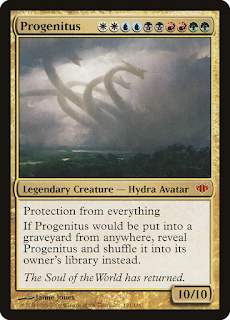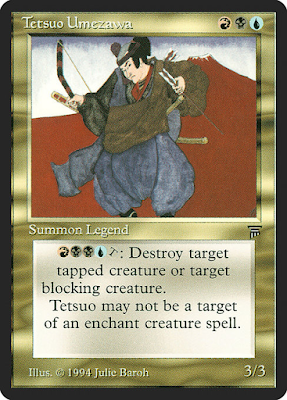Because for rational beings to see or re-cognize their experience in a new material form is an unbought grace of life. Experience translated into a new medium literally bestows a delightful playback of earlier awareness. The press repeats the excitement we have in using our wits, and by using our wits we can translate the outer world into the fabric of our own beings.
—Marshall McLuhan, Understanding Media (1964)
Wednesday, May 18, 2022
Magic: The Gathering: The Worldbuilding: The Writeup (8 of 8)
Monday, May 16, 2022
Magic: The Gathering: The Worldbuilding: The Writeup (7 of 8)
We're drawing closer to the point where I started playing Magic: The Gathering again after Weatherlight alienated me, and something occurred to me regarding Magic's remarkable persistence as a game, a community, and institution.
Somebody who collected and played with Magic cards at any point in their lives can return to the game after a decade or longer and still use their old cards at kitchen table games. If their collection consists mostly of cards from Mercadian Masques and Invasion, they probably won't win many games today—but their old decks still qualify them to participate in casual play with friends. The metagame changes, sure, but the only cards that have become completely incompatible with the game are a few very old ones that assumed people played for ante.
Once again, let's use Street Fighter as a counterexample. A person who dropped hundreds of quarters playing Street Fighter II circa 1993, skipped out on Street Fighter Alpha, Street Fighter III, Capcom Vs. SNK, SNK Vs. Capcom, etc., and then had his interest piqued by Street Fighter IV in 2008 would have discovered a game that resembled the one he'd been hooked on a decade and a half earlier, but was nevertheless a different animal. Street Fighter IV's Ryu might handle similarly to his Street Fighter II version, but even apart from the all the new moves, IV's fundamental mechanics are not the same as II's. Even if all the hours he committed to playing Street Fighter II gave our guy a leg up on somebody who was a total novice to 2D fighters, he still had to learn an entirely new game with its own intricacies and fine technical points.
Magic: The Gathering is like what Street Fighter II would be if Capcom had continuously updated it with new characters and the occasional balance tweaks for thirty years. (If "Super Street Fighter II Turbo" is a cumbersome title, imagine what its twentieth or thirtieth version would have been called. By that point, Capcom would have probably taken a cue from SNK and called it Super Street Fighter II Turbo 2021 instead of something like Double-Plus Ultra Street Fighter II #Reloaded Champion βst ¡Prime! Edition." But we digress.)
I suppose Maple Story is a good instance of a video game actually doing this in practice. Hundreds of thousands of people still play Maple Story, but that's a precipitous decline from the 92 million users crowding its servers back in 2009. It's clearly showing its age, and there's the dilemma: at this point, modernizing it would amount to melting it down and remaking it. Nexon might as well just announce Maple Story 3 at that point—and judging from the brief lifespan of Maple Story 2, its reluctance is understandable. Since its obvious datedness precludes it from attracting many new players, the plan seems to be to let it run on fumes for as long as enough people still play it out of habit, come back for the updates, or revisit it in a sudden fit of nostalgia (as Shirley did last winter), and are enticed to spend real money on fake swag once they're there.
But playing cards don't obsolesce. They're slips of cardboard. A CCG has no user interface that becomes clunky in comparison to newer products, no core engine that hits its practical limit, and relatively few "patches" (rules changes) that fundamentally change how cards operate in play. Thirty years later, your Beta Edition copy of Lightning Bolt still deals three damage to any target at instant speed, and nobody cares that the art isn't digitally enhanced, the card layout differs from later printings, or that the wording of the rules text isn't as rigorous as it became later on.
If you knew how to play Magic twenty years ago, you know how to play it now. Adjusting to things like the removal of mana burn from the rules and the loosening of the restrictions on legendary creatures (the same player can't have two copies of Jedit Ojanen in play, but two different players can each have one) might take some getting used to, but you're not going to be like the inveterate Street Fighter III fanatic (me) who tried to like Street Fighter IV, but couldn't get past the idea that it was an inferior reiteration.
There was never a Magic: The Gathering II, Magic: The Gathering Champion Edition, Magic: The Gathering Sword & Shield. After almost thirty years, it's still the same game—which goes a long way towards accounting for how easy it can be to get hooked on it again after a long absence. The original recipe and all its addictive active ingredients remain exactly the same.



